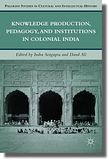Knowledge Production, Pedagogy, and Institutions
Sengupta, Indra [u.a.] [Hrsg.]:
Knowledge Production, Pedagogy, and Institutions in Colonial India / ed. by Indra Sengupta and Daud Ali. - New York : Palgrave Macmillan, 2011. - ca. 272 S. - (Palgrave Studies in Cultural and Intellectual History)
ISBN 978-0-230-11337-4
£ 55,00
DDC: 001.2095409034
-- Angekündigt für Mai 2011 --
Beschreibung
This volume seeks to radically revise the Saidian analytical framework which dominated research on the subject of colonial knowledge for almost two decades, which emphasized colonial knowledge as a series of representations of colonial hegemony. It seeks to contribute substantially to research in the field by analyzing knowledge in colonial India as a dynamic process, produced in historically specific, and changing, social and intellectual contexts, and as an essentially unstable, fractured and contingent set of ideas and practices, produced in unpredictable and often self-contradictory ways for different audiences. It also focuses on the very important and neglected questions of indigenous agency in producing knowledge in colonial India and the related problem of knowledge dissemination and transmission. [Verlagsinformation]
Inhalt
PART I: PRODUCING COLONIAL KNOWLEDGE
J. Majeed: What's in a (Proper) Name?
K. Teltscher: The Floating Lexicon
G. Oddie: Missions and Museums, 1820-1860
A.J.Etter: Antiquarian Knowledge and Preservation of Indian Monuments at the Turn of the Nineteenth Century
PART II: HISTORICAL PLACES, HISTORICAL PASTS
C. Zutshi: Landscapes of the Past
M. Dodson: Jaunpur, Ruination, and Conservation during the Colonial Era
D. Lelyveld: The Qutb Minar in Sayyid Ahmad Khan's Asar al-sanadid
PART III: PEDAGOGY AND TRANSFORMATION
P. Gottschalk: Promoting Scientism
A. Powell: Old Books in New Bindings
M. Pernau: Teaching Emotions
Herausgeber
INDRA SENGUPTA is a Research Fellow in British Empire and Commonwealth History at the German Historical Institute London, UK. Her research interests include the production of knowledge on India in colonial India and Europe, especially German Orientalism, and monument-making practices in colonial India. Her current research is on monument-making in colonial India in colonial and metropolitan perspectives. She is the author of From Salon to Discipline: State, University and Indology in Germany, 1821–1914 (Heidelberg, 2005), has edited a special issue called Memory, History, and Colonialism: Engaging with Pierre Nora in Colonial and Postcolonial Contexts, Bulletin of the German Historical Institute London, Supplement 1 (2009).
DAUD ALI is Senior Lecturer in Indian History at the School of Oriental and African Studies (SOAS), University of London, UK. His area of specialization is early medieval Indian history (c. 300-1200 CE). He has published articles on courtly and monastic discipline in early India, conventions in erotic poetry and courtship, domestic slavery in medieval south India, and conceptions of space and time in imperial Chola inscriptions. He is author of Courtly Culture and Political Life in Early Medieval India (Cambridge, 2004); he has also co-authored, with Ronald Inden and Jonathan Walters, Querying the Medieval: Texts and the History of Practice in South Asia (Oxford, 2000), and edited Invoking the Past: the Uses of History in South Asia (Oxford, 1999). Profile page.
Quellen: Palgrave Macmillan; WorldCat; Amazon; Library of Congress
Ähnlich
- Llewellyn-Jones: Last King in India
- Sohi: Echoes of Mutiny
- Fischer-Tiné: Shyamji Krishnavarma
- Biedermann: The Portuguese in Sri Lanka and South India
- Cederlöf: Founding an Empire on India's North-Eastern Frontiers
- Agnani: Hating Empire Properly
- Hughes: Animal Kingdoms
- Datla: The Language of Secular Islam
- Avelar: História de Goa
- Paranjape: Making India

